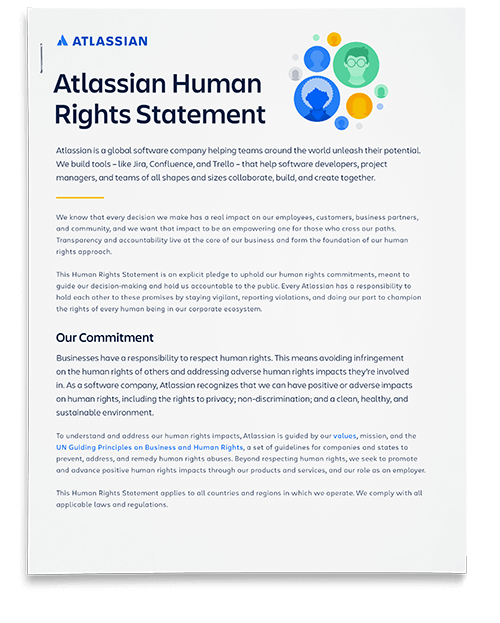Atlassian Human Rights Statement

Atlassian is a global software company helping teams around the world unleash their potential. We build tools – like Jira, Confluence, and Trello – that help software developers, project managers, and teams of all shapes and sizes collaborate, build, and create together.
We know that every decision we make has a real impact on our employees, customers, business partners, and community, and we want that impact to be an empowering one for those who cross our paths. Transparency and accountability live at the core of our business and form the foundation of our human rights approach.
This Human Rights Statement is an explicit pledge to uphold our human rights commitments, meant to guide our decision-making and hold us accountable to the public. Every Atlassian has a responsibility to hold each other to these promises by staying vigilant, reporting violations, and doing our part to champion the rights of every human being in our corporate ecosystem.

Our Commitment
Businesses have a responsibility to respect human rights. This means avoiding infringement on the human rights of others and addressing adverse human rights impacts they’re involved in. As a software company, Atlassian recognizes that we can have positive or adverse impacts on human rights, including the rights to privacy; non-discrimination; and a clean, healthy, and sustainable environment.
To understand and address our human rights impacts, Atlassian is guided by our values, mission, and the UN Guiding Principles on Business and Human Rights, a set of guidelines for companies and states to prevent, address, and remedy human rights abuses. Beyond respecting human rights, we seek to promote and advance positive human rights impacts through our products and services, and our role as an employer.
This Human Rights Statement applies to all countries and regions in which we operate. We comply with all applicable laws and regulations.
I. Employees & Contingent Workers
Every Atlassian has the right to work in an environment that is respectful, professional, and free from all forms of discrimination, harassment, bullying, and retaliation. We count on all of our colleagues to help ensure that all our employees around the globe, with diverse beliefs and viewpoints, work in an inclusive environment where they feel safe and comfortable to bring their full selves to work. We do not tolerate discrimination against or harassment of employees, consultants, or contractors. Any experience of discrimination, harassment, bullying, or retaliation can be reported immediately to any of the available resources listed in the below section, “Raising Concerns and Grievances."
We are committed to respecting our employees’ fundamental rights at work, including non-discrimination, equal pay for equal work, fair and just remuneration, privacy, and a safe workplace. Our commitments to and expectations of our employees are detailed in our policies and guidelines, including the Code of Business Conduct & Ethics.
Atlassian is also committed to ensuring that all our employees have equal access to opportunities within the workplace. We strive to create an authentic culture of inclusion, whereby every individual feels valued, respected, and supported, and we aim for nothing short of equity for every Atlassian. We regularly evaluate and communicate honestly, both to employees and the public, about how we are living up to (and/or falling short of) these commitments.
In 2021, Atlassian invested in a diversity, equity, and inclusion (DEI) transformation by building a strategy with a clear roadmap, milestones, a larger team, and an expanded budget with leadership commitment to match our ambitions for creating a truly inclusive workplace with real mechanisms for accountability and structural change.
II. Customers
We are committed to respecting the rights of customers of our products and services, and we recognize that customers can host potentially harmful content or may use our products in ways that harm others. We set clear standards for how our products must be used, and define what constitutes abuse or misuse in our Acceptable Use Policy. Under this policy, we also reserve the right to remove content that is inconsistent with the spirit of the guidelines and may permanently or temporarily suspend or terminate a user’s account or access to services if Atlassian determines that a user has violated this policy.
We believe privacy is a fundamental human right, which means that we embrace privacy by design in everything we do. As part of our Privacy Principles, we are committed to being transparent about how we collect, use, and share information, and delivering a familiar, straightforward privacy structure. Our Trust Center includes the latest information on the security, reliability, privacy, and compliance of our products and services.
While we are excited by the potential of artificial intelligence (AI), machine learning (ML), and other emerging technologies to enhance our customers’ experience, we recognize that these new technologies can also pose unique risks. For example, the way that AI/ML systems are developed and deployed (including data sets, decision-making models, and product application), can cause discriminatory harm to groups that are already marginalized, including through bias in algorithms and data and through unequal access to the benefits of these technologies. Given these risks, and in line with our commitment to diversity, equity, and inclusion, we will strive to be open and transparent about how we are using these technologies, and ensure they are being designed and deployed responsibly.
III. Business Partners & Suppliers
Atlassian’s Supplier Code of Conduct sets our expectations for our partners and suppliers, including a directive to conduct business in a responsible manner, with integrity and high ethical standards, and in compliance with the law. Other obligations include complying with all applicable laws on non-discrimination and anti-harassment in hiring and employment, promoting safe and secure workplaces, respecting employees’ lawful right of free association, and complying with all applicable laws on work hours, overtime, wages, and benefits.
Suppliers will only employ workers with a legal right to work. Atlassian does not tolerate any form of modern slavery or human trafficking in our business and we are fully committed to preventing and detecting it. In compliance with the United Kingdom’s Modern Slavery Act (2015) and Australia’s Modern Slavery Act (2018), Atlassian outlines the steps we have taken to identify and develop a strategy designed to better manage our exposure and ensure continuous improvement of the risks of modern slavery to its supply chain and business operations.
Atlassian reserves the right to investigate any instances of a supplier’s non-compliance of which it becomes aware. Non-compliance may be grounds for Atlassian to void or terminate contractual obligations with a supplier without penalty.
IV. Community & Planet
The UN recognizes that a clean, healthy, and sustainable environment is a human right (Resolution 48/13) and climate change has profound impacts on a wide variety of other human rights. Moreover, the impacts of climate change are not borne equally or fairly. Often, marginalized, underserved, and vulnerable communities can be more susceptible to risks posed by climate impacts.
Given these significant impacts on our planet and community, Atlassian aims to be sustainable in everything we do. Atlassian runs our operations on 100% renewable electricity and has committed to achieving net-zero emissions by 2040 on a 1.5C pathway. As part of that long-term commitment, the Science-Based Targets initiative has approved our near-term 2025 targets to reduce our emissions related to our operations, business travel, and supply chain.
We engage in public-policy efforts that address key social, economic, environmental, and political issues. In addition, we participate in multi-company initiatives and collaborations to learn, share, and advocate for business and human rights issues. These can be found in our annual Sustainability Report.
We created the Atlassian Foundation with the vision of helping make the world better. As a company, we contribute 1% of our profits, employee time, equity, and products to social impact organizations.
Our Approach
Governance & Due Diligence
This statement is approved by our Co-founders/Co-CEOs and implementation is led by our Sustainability team, in collaboration with teams across Atlassian. We will review this statement annually and continuously improve our ability to fulfill our commitments. We have a Human Rights Working Group with representatives from the Sustainability, Public Policy, Privacy, Commercial Legal, Risk, and Trust teams that focuses on integrating a human rights approach across Atlassian. As part of that, we’ve included the findings of an internal human rights assessment into Atlassian’s enterprise risk management process to prioritize the most salient risks, assign responsibility, and track progress.
Reporting
We recognize that transparency and accountability are central to earning the trust of our employees, partners, and customers. In the spirit of one of our values, “open company, no bullshit,” we report publicly on our sustainability, DEI, and human rights commitments through an annual Sustainability Report – details on all of the above can be found there. We take a progress-over-perfection approach to sustainability, and we are committed to disclosing what’s working and what’s not.
We publish a regular Transparency Report, disclosing law enforcement requests to access customer information (where permitted), including whether and how we complied. As stated in our Guidelines for Law Enforcement Requests, we carefully review requests to ensure they comply with the law and are within the powers of the requesting authority or law enforcement official.
Stakeholder Engagement
Atlassian believes it is important to engage in consultation with diverse stakeholders to ensure a full understanding of how our company’s actions and decisions can affect individuals and groups. Potentially affected stakeholders include internal stakeholders (employees and contingent workers), and external stakeholders (suppliers, partners, customers, and end users of products). They also include civil society groups that focus on human rights, shareholders, and responsible investors.
Atlassian welcomes the opportunity to engage with organizations and other stakeholders to better understand human rights issues related to our company, our value chain, and the community and planet at large. We will proactively engage these groups and conduct proper due diligence, and we can be reached via email at any time: sustainability@atlassian.com.
Raising Concerns & Grievances
Atlassian offers multiple channels to our employees, consultants, suppliers, and business partners to report concerns. In the event that you cannot raise a concern to your supervisor or Atlassian point of contact, you may communicate with the Compliance Officer through the following channels:
- In writing by email to Compliance-Officer@atlassian.com (this option does not allow for anonymous reporting)
- Anonymously via the Atlassian Ethics and Compliance Portal
- Calling 1.800.461.9330 in the United States or 1.800.763.983 in Australia; for other locations, visit https://www.atlassian.com/ethics
- Submitting a report at https://www.atlassian.com/ethics, a secure web portal powered by Convercent, a third-party provider.
The above methods are preferred, but you may also send an anonymous message by mail, addressed to:
Compliance Officer, Atlassian Corporation
350 Bush Street, 13th Floor
San Francisco, California 94104 USA
We promote awareness of these reporting channels through policies and communications. We prohibit retaliation against anyone who, in good faith, raises a grievance or concern.
